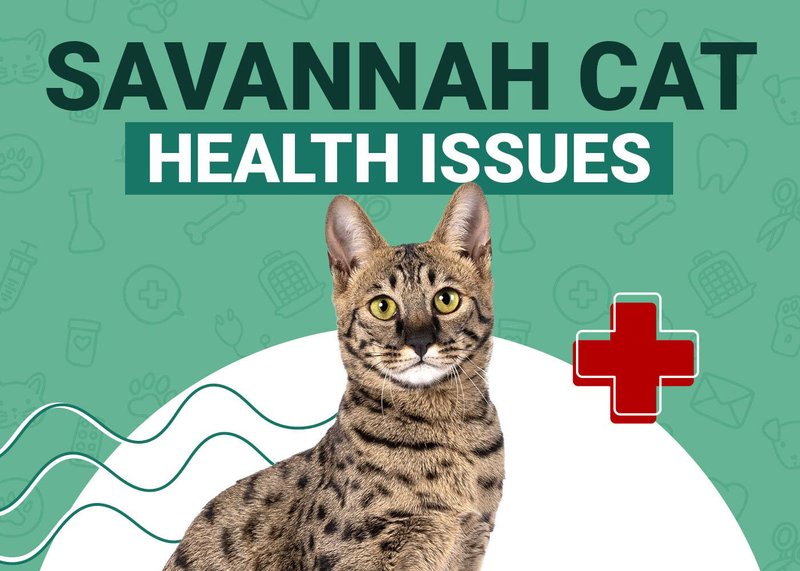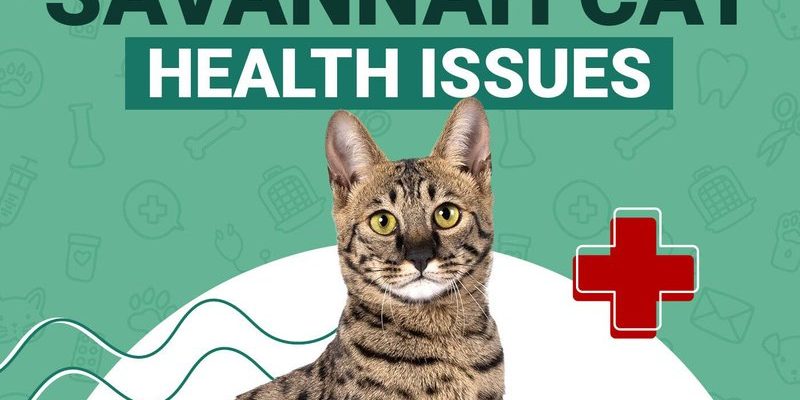
Just like how you wouldn’t ignore a car’s warning light, you can’t overlook your cat’s health signals. Nor should you take their majestic appearance for granted; they still need regular check-ups and a proper diet. In this article, we’ll dive deep into the common health problems that Savannah cats might face and provide handy tips on preventing them. Think of it as your friendly guide to giving your furry friend the best life possible.
Understanding Genetic Disorders in Savannah Cats
One of the first things to know about Savannah cats is that they can inherit certain genetic disorders. Because they’re a hybrid between a domestic cat and a serval, some issues can crop up in this mix. For example, certain lineage lines might be more prone to heart disease, such as hypertrophic cardiomyopathy (HCM). This condition causes the heart muscles to thicken, which can lead to heart failure.
If you’re adopting or buying a Savannah, always ask about its family history. Renowned breeders often conduct screenings for these conditions, so it pays to do your homework. Regular vet visits are essential in catching any early signs. If your vet suspects a heart condition, they may recommend tests like ultrasound or x-rays. By staying proactive, you help your kitty stay healthy and strong.
Managing Obesity in Savannah Cats
Savannah cats are highly active and need regular exercise, but managing their weight is crucial. Obesity is a common health issue that can lead to diabetes, joint problems, and even heart disease. Picture it this way: if you had a couch potato lifestyle, you’d feel sluggish too!
To prevent your Savannah from tipping the scales, provide plenty of playtime and stimulating activities. Invest in toys that encourage movement—think feather wands, laser pointers, or even a cat tree for climbing. Keeping a regular feeding schedule with high-quality, portion-controlled meals can also help maintain a healthy weight. Here’s the thing: a few extra treats won’t hurt, but moderation is key!
Avoiding Dental Issues
Just like humans, cats can face dental problems. Savannah cats are not immune to issues like gingivitis and periodontal disease. If you’ve ever had a toothache, you can imagine how uncomfortable that must be for your feline friend. It’s essential to prioritize their dental health to prevent painful conditions down the road.
You can start a simple dental care routine at home. Brushing their teeth a few times a week can massively improve their oral health. There are even special toothpaste and brushes made for cats! Additionally, consider providing dental treats designed to reduce plaque. Regular check-ups with your vet for cleanings and evaluations can keep their pearly whites in top shape.
Preventing Urinary Tract Problems
Urinary tract problems are another common concern for Savannah cats. Conditions like crystals or stones in the urinary tract can be painful and lead to serious health issues if left untreated. Imagine a cat struggling to use the litter box; it’s a situation none of us want to see happen.
You can prevent urinary troubles by ensuring your cat is well-hydrated. Providing fresh water daily and considering a wet food diet can help them stay hydrated. This is particularly crucial for male cats, as they are more prone to urinary blockages. Also, keep an eye on their litter box habits. If you notice changes, such as straining or frequent trips to the box, it’s best to consult your vet.
Understanding Gastrointestinal Issues
Savannah cats may also face gastrointestinal issues, including vomiting, diarrhea, and other digestive problems. These can be caused by allergies, poor diet, or sudden changes in food. It’s a bit like if you tried a new dish that didn’t agree with your stomach—your cat can feel the same way!
To keep your Savannah’s tummy happy, feed them a balanced diet formulated for their specific needs. Transition to new food gradually, so their digestive system can adjust. If your cat frequently experiences stomach issues, a vet consultation is necessary. They can help pinpoint any food allergies or intolerances—because nobody wants to play the guessing game with their cat’s diet!
Monitoring Joint and Bone Health
As Savannah cats age, they may be prone to joint and bone issues, especially if they lead an active lifestyle. Conditions like hip dysplasia or arthritis can occur, affecting their mobility and quality of life. Think of it like an athlete facing injuries over time; joints can wear down from all that movement.
To help maintain your cat’s joint health, ensure they are at a healthy weight. Obesity can put added strain on their joints. Regular exercise is also vital—keeping those muscles strong can support their bones. If you notice your Savannah becoming less active or having difficulty jumping, don’t hesitate to consult your vet.
The Importance of Regular Vet Check-Ups
Finally, the best way to prevent and address any health issues is through regular veterinary check-ups. Just like you wouldn’t skip your own doctor’s appointments, your cat needs the same care. Routine exams allow for early detection of potential problems, which can lead to better outcomes.
During these check-ups, your vet will assess your cat’s overall health and can recommend vaccinations, dental care, and dietary changes as needed. Establishing a good relationship with your vet can be invaluable. They can guide you through any concerns you may have about your Savannah’s health.
Final Thoughts
Owning a Savannah cat can be a rewarding experience filled with joy and companionship. However, it’s crucial to be aware of common health problems and how to prevent them. From monitoring for genetic disorders to ensuring they maintain a healthy weight, being proactive will lead to a happier, healthier life for your feline friend. Remember, you’re not just their owner; you’re their best advocate. So, keep them active, offer them healthy food, and don’t hesitate to reach out to your vet when needed. With a little attention and care, your Savannah cat can thrive in your loving home!

